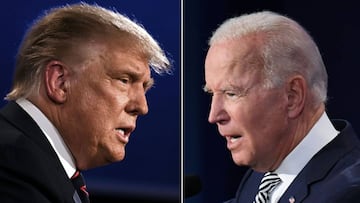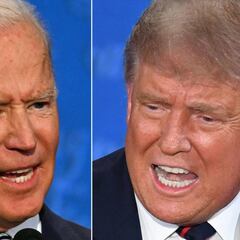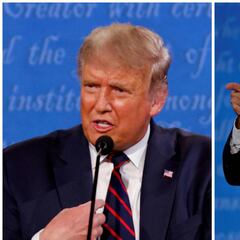USA Elections 2020: will be there another debate between Trump and Biden?
With the second presidential debate officially now cancelled, will the president and his challenger go head to head again before election day?

Just a week ahead of the second Trump-Biden debate on 15 October, it was officially cancelled. Trump had, the day before, rejected a decision by the nonpartisan commission to change the format to a virtual event instead of face-to-face in a studio.
Originally scheduled as a town hall-style encounter in Miami, the debate was to be the second of three presidential debates. After Trump refused to take part in a virtual debate, Biden scheduled a televised town hall-style event for himself that evening.
The third and final presidential debate is planned for 22 October in Nashville, Tennessee and to date, is still proceeding as planned.
The Commission on Presidential Debates (CPD) said in an emailed statement: "It is now apparent there will be no debate on October 15, and the CPD will turn its attention to preparations for the final presidential debate scheduled for October 22."
UPDATE 6:36pm ET: @debates issues a statement saying: “It is now apparent there will be no debate on October 15, and the CPD will turn its attention to preparations for the final presidential debate scheduled for October 22.” pic.twitter.com/7PNJCoKE2W
— Ed O'Keefe (@edokeefe) October 9, 2020
The low-down on the final presidential debate.
Why was the second debate cancelled?
Trump announced last Friday that he had tested positive for covid-19 and spent three days hospitalized receiving treatment before being released on Monday. The Republican president, seeking re-election on 3 November, on Thursday called the format change in which he and Biden were to participate from remote locations "ridiculous" and said it would be a waste of his time to take part.
Trump's campaign on Friday accused the commission, headed by a former chairman of the Republican National Committee, "biased" toward Biden.
Says the campaign that ran for the hills from the only debate in which voters get to ask the questions. https://t.co/XklSjHtB18
— Andrew Bates (@AndrewBatesNC) October 11, 2020
"It's shameful that Donald Trump ducked the only debate in which the voters get to ask the questions - but it's no surprise," Biden campaign spokesman Andrew Bates said.
Trump constantly interrupted and talked over both Biden and the moderator in the chaotic first debate.
Trump Doctor: not contagious
Trump’s Doctor, Sean Conley said Saturday night in a statement that the president was “no longer considered a transmission risk to others.”
In the written memo he continued:
“This evening I am happy to report that in addition to the president meeting C.D.C. criteria for the safe discontinuation of isolation, this morning’s Covid P.C.R. sample demonstrates, … he is no longer considered a transmission risk to others…now at day 10 from symptoms onset, fever-free for well over 24 hours and all symptoms improved, the assortment of advanced diagnostic tests obtained reveal there is no longer evidence of actively replicating virus.”
By Conley’s assessment, Mr. Trump would have needed to show signs of his illness on Wednesday, September 30, for Saturday to qualify as 10 days after the onset of symptoms. There is still no clarity from the dedicated medical team on the date at which Trump last tested negative for covid-19.
According to guidelines laid out by the Centers for Disease Control and Prevention, people with severe covid-19 may need to isolate for up to 20 days. It is still possible that the president’s health could deteriorate in the next few days.
“Persons with more severe to critical illness or severe immunocompromise likely remain infectious no longer than 20 days after symptom onset.”
Off to the side of the White House event, not wearing a mask: Dr. Scott Atlas pic.twitter.com/yECbfzyU6t
— Jonathan Lemire (@JonLemire) October 10, 2020
Trump is set to campaign in Florida tomorrow, and held a rally for thousands of people from his White House balcony on Saturday.
Related stories
A new Reuters/Ipsos poll showed Americans steadily losing confidence in how Trump has managed the pandemic, with his net approval rating on the issue hitting a new low.
For the latest on this story as it develops and all US coronavirus news, follow our dedicated rollling feed.


